OUR MISSION
Honor the rich history of tea.
Oliver Pluff is an all-American company preserving the tradition of time-honored teas and early American coffee blends. The tradition of tea and coffee spans American history in its entirety. Our teas and coffees honor this history through flavors, ingredients, and more.
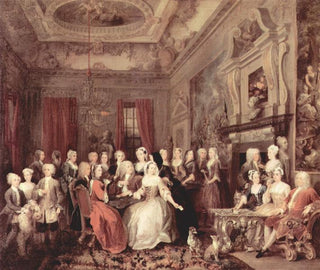
OUR PROMISE
Sip a Cup of History
A cup of Oliver Pluff tea or coffee is a toast to superior quality of ingredients, and a tribute to the American story. We would love to share a cup of history with you!
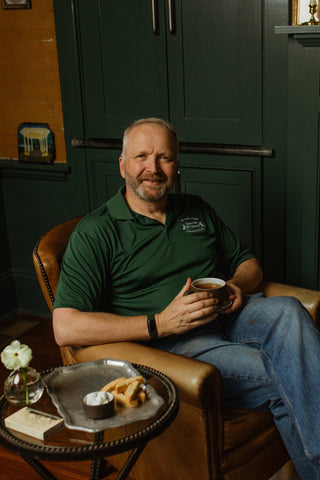
Owner and Tea Blender
Darren Hartford
Darren was born and raised in Smithfield, Maine. Darren spent over 28 years in the Air Force where he had the opportunity to travel the world and experience many different tea and coffee cultures. He and his family settled in Charleston and he is enjoying sharing the story of Early American Beverages!
Our Team
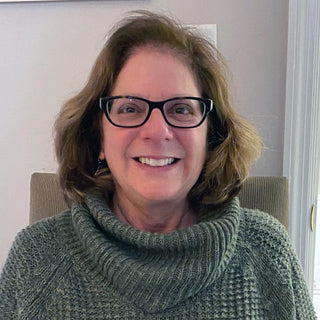

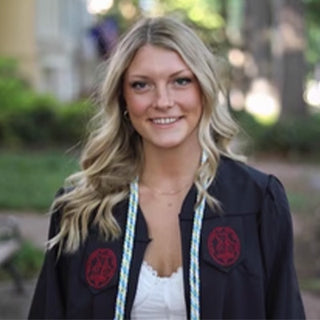

Assistant Warehouse Manager
Victoria Velez

Graphic Designer
Brandon Frye
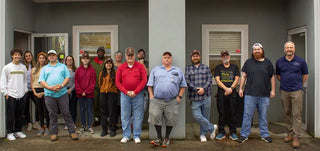
The Warehouse and Production Team
No. 5 - Plan upon which the Exportation of Tea on behalf of the Company to America take place
Index: Tea Leaves - A Collection of East India Co. Letters, 1773
Mr. Palmer's Compliments to Mr. Wheler, encloses the Outlines of a Plan upon which the Exportation of Tea on behalf of the Company to America take place. Mr. P. will attend the Committee whenever he is desired.
PLAN.
Admitting that an exportation of tea to America by licence takes place immediately, in order to prevent the[206] colonists from becoming purchasers at the sales of foreign companies, usually made from September to November, and consequently at least discourage those companies from encreasing their China trade, and also to obtain some information, though imperfect, before the investments for the China ships of the ensuing season are ordered. It is proposed that chests of Bohea tea, chests of each specie of Singlo tea, together with a smaller assortment of Hyson, Souchong, & Congou tea be consigned to such a number of merchants conjointly as may be thought sufficient, (for whom their correspondents in England shall give satisfactory security,) together with such persons as shall be thought proper for that purpose to be sent from thence. That upon the arrival of such tea in Boston public notice shall be given thereof through the Continent, and also that it is the intention of the East India Company, if the sales of this cargo should be found to answer, to repeat such consignments, in order to supply that Continent with teas at least equal in price to what they must pay for the same if obtained in a way of illicit trade. That in order to conduct these sales in the most advantageous manner, the parties to whom the cargoes shall be entrusted shall act as one body; that the concurrence of the majority shall be necessary for any act therein; that each party shall be answerable for himself only, but that no credit shall be given to bills received for paying without the assent of at least three of the persons so appointed; that it shall be the object of the person who may be appointed to go with the cargo to obtain all possible information respecting the actual consumption, mode of sale, species of tea that may be introduced, & opportunity of remittances at Boston, where it is proposed the first consignment[207] shall be made, as it is the only considerable mart, where tea from England is at present received without opposition, and having so done he shall visit such other places on the Continent as may be thought proper, but particularly New York and Philadelphia, in order to obtain the same information at those several places, and learn, from being on the spot, how far the New Yorkers, &c., will hold their solemn engagements, when they find the advantages they will probably reap by receiving tea from England. They having obtained all such necessary information, he shall return to England & report the same, from which time it is presumed there will be full employ for such agent without any additional expence to the Company in preparing such assortments of tea as may from time to time be required for this market, and can be best spared from the necessary demand of Great Britain & Ireland, and also in negotiating the remittances that may from time to time be received on account of this concern.
That such an appointment is absolutely necessary must appear to every one at all acquainted with the nature of the tea trade, not only properly to regulate these investments, but also from time to time to preserve proper assortments of tea for the consumption of Great Britain & Ireland, and indeed in this particular alone could the directors for some years past have had such information, from any person in whose abilities & integrity they could have placed a proper confidence, and who, from the nature of such trusts, must be placed above the temptation to any sinister practices the Company, from the resources of the tea trade alone, would probably never have been involved in their present difficulties.
LETTER FROM Messrs. GREENWOOD & HIGGINSON.
Gentlemen:
We are informed that you have come to a resolution to ship tea to America, we therefore beg leave to recommend our friends, Mr. Andrew Lord, and Messrs. Willm. & George Ancrum,[28] of Charles Town, in South Carolina, merchants, for the consignments of such part as you may ship to that place. Both houses are of the first repute, and have been long established there, and also to tender to you our ship the London, Alexander Curling, Master, to carry the same out, who shall be ready to sail whenever you please to account.
We are, your most humble servants,
Greenwood & Higginson.
London, 4 May, 1773.
To the Hon'ble the Court of Directors
of the United Company of Merchants
of England, trading to the East Indies.
LETTER FROM Mr. FRED'K PIGOU, Junr.
Gentlemen:
Being informed you intend to export teas to several different settlements in America, to be sold there under the[209] direction of agents to be appointed. I beg leave to acquaint the Court that I have a house established in New York, under the firm of Pigou & Booth, and I humbly solicit the favor of that house having a share of the consignments.
Philadelphia being also a port to which the Company will most likely send teas, I beg leave to recommend Messrs. James & Drinker, of that city, to be one of your agents there.
Should I be so happy to succeed in my request, I am certain the greatest attention will be paid by those gentlemen to the Company's orders, and that the Company's interest will be made their study in the sales and remittances. I also beg leave to observe that if ships should be wanted for this service, I have vessels now ready for the ports of Philadelphia and New York.
I am, gentlemen,
Your most obed't & very humble serv't,
Fred'k Pigou, Junr.
Mark Lane, 1st June, 1773.
To the Hon'ble the Court of Directors
of the United East India Company.
LETTER FROM Mr. JONATHAN CLARKE.
London, 1st July, 1773.
Gentlemen:
I intended to have made a purchase of teas at your present sale to have exported to America, but the candid[210] intimation given by you of an intention to export them to the Colonies on account of the Company, renders it disadvantageous for a single house to engage in that article.
I now beg leave, gentlemen, to make a tender to you of the services of a house in which I am a partner, Richard Clarke and Sons,[29] of Boston, New England, to conduct the sale of such teas as you may send to that part of America, in conjunction with any other houses you may think proper to entrust with this concern; altho' I have not the honor of being personally known to many of you, I flatter myself our house is known to the principal merchants who deal to our Province, and are known to have always fulfilled our engagements with punctuality & honor, and trust I shall procure you ample security for our conducting this business, agreeable to the direction, we may from time to time receive from you.[211]
In soliciting this favor, I beg leave to avail myself further of the circumstance of our having for a long time been concerned in the tea trade, and to greater extent than any house in our Province, with one exception. Of the disappointment I have met with in my intended adventure, by which we are deprived of a very valuable branch of our business, and on my being on the spot to take such instructions from you as may be requisite in disposing of what you may send. And give me leave to add my assurances that the interest of the East India Company will always be attended to by the house of Richard Clarke & Sons, if you think fit to repose this confidence in them.
I am, very respectfully, gentlemen,
Your most obed't & humble servant,
Jonathan Clarke.
To the Hon'ble Directors of the
East India Company.
Mr. Clarke also enclosed two letters in his favor; one from Messrs. Henry & Thos. Bromfield, the other from Mr. Peter Contencin, merchants.
June 5th, 1773.
Sir:
The bearer, Mr. Barkly, is the person whom I took the liberty of recommending to you as a person able and qualified to give you information touching the quantity of[212] tea that is now consumed in America, and to serve the Company in that part of the World in case the Directors shall judge it proper to make any establishment there for selling tea on the Company's account, & I am, sir,
Your most obedient and most humble servant,
Grey Cooper.[30]
Received from Henry Crabb Boulton, Esq.
Hon'ble Sirs:
Being informed of your resolution to export a quantity of tea to different parts of America, we take the liberty of recommending our friends, Messrs. Willing, Morris & Co., to be your agents at Philadelphia, for whom we are ready to be answerable.
We are, very respectfully,
Your honors most obedient, humble servants,
Roberts, Baynes & Roberts.
8 June, 1773.
To the Hon'ble the Committee of Warehouses.[213]
London, 9th June, 1773.
Gentlemen:
I have understood that you propose fixing agents in the different colonies in America, to dispose of certain quantities of tea; if so, I am a native and merchant of Virginia, and think it will be in my power to execute your commands in that quarter, on terms equal, if not superior, to any one in it.
There are some things respecting this business that come within my knowledge; which are too prolix for a letter, but if the Court chuses to notice my petition, I shall be happy and ready to give any intelligence in my power.
I am, gentlemen,
Your very obed't & hum'ble serv't,
Benj. Harrison, Junr.
At Webbs, Arundel Street, Strand.
To the Hon'ble Court, &c.
Gentlemen:
Being informed that you have it in contemplation to export tea to the different Provinces in North America, for sale on the Company's account, I beg leave to recommend my brother, Mr. Jonathan Browne, merchant, in Philadelphia, as an agent for any business you may have to transact at that place, and I flatter myself his activity [214]& knowledge of the trade of that country, acquired by a residence of upwards of fifteen years, will render him deserving of your notice.
Any security for his conduct I am ready to give, and to any amount you shall think necessary for the discharge of the trust you may be pleased to repose in him.
I am, very respectfully, gent.,
Your most obed't & humble serv't,
George Browne.
London, Tower Hill, 11th June, 1773.
To the Committee of Warehouses.
Gentlemen:
As many difficulties seem at present to attend the exportation of tea to America in large quantities, on account of the Company, if the expedient is approved by this Court, of sending about 200 chests of Bohea tea, and a small assortment of other species to Boston, by way of experiment, and you should think proper to entrust such cargo to the care of Messrs. Hutchinson, merchants, there, I am ready, as a security, to advance upon the same the sum such tea shall amount to, at the prime cost in China & freight from hence, before the shipping thereof, provided I am permitted[215] to charge interest upon such advance, until remittances for the same are received from America.
I am, gent.,
Your humble serv't,
Wm. Palmer.
Devonshire Square, 24th June, 1773.
To the Hon'ble Court of Directors, &c., &c.
Sir:
The Committee of Warehouses of the East India Company desire you will meet them at this house, on Thursday next, at twelve o'clock at noon, relative to the exportation of tea to America.
I am, sir,
Your most humble serv't,
Wm. Settle.
East India House, 25th June, 1773.
To Brook Watson,
Jonathan Clarke,
Frede'k Pigou, Junr.
Gilbert Barkly,
George Browne,
Roberts, Baynes & Roberts,
Wm. Kelly,
Greenwood & Higginson,
Benjamin Harrison,
Samuel Wharton,
Geo. Hayley & John Blackburn, Esqrs.
[216]
Gentlemen:
The enclosed newspapers contain the sentiments of the Americans with regard to the quantity of teas consumed in that country, and the fatal consequences attending buying it from foreigners, by leading them to purchase other articles of East India goods at the same markets which otherwise would not be an object, and which, of course, would be commissioned from the mother-country.
The memorial, which I had the honor to deliver, lately points out an undoubted method for gaining this trade.
The Company being the exporters, pays the American duty of 3d. pr lb., of which they will be amply repaid by the advance on their sales, and as mankind in general are bound by interest, and as the duty of about a shill'g pr lb. is now taken off tea when exported, the Company can afford their teas cheaper than the Americans can smuggle them from foreigners, which puts the success of the design beyond a doubt.
It may be suggested that the Americans have not money to pay for those goods. The Province of Pennsylvania alone ships yearly to the West Indies, Spain, Portugal & France, &c., above 300,000 barrels of flour, large quantities of wheat, Indian corn, iron, pork, beef, lumber, and above 15,000 hhds. of flax seed to Ireland, and the other Provinces are equally industrious. The principal returns are in silver and gold, with bills of exchange, an incredible part of which will center with the Company should the same be executed agreeable to the plan proposed, and smuggling will be effectually abolished without any additional number of officers and cruizers.[217]
Warehouse rent, &c., in America, will come as cheap as it is in England; and by the mode proposed for disposing of the teas, the grocers and merchants will be quickly served without any risk of loss by bad debts. I beg your forgiveness for the freedom I have taken. I have the honor to be, with due respect, gentlemen,
Your most obed't & humble servant,
Gilbert Barkly.
Lombard Street, 29 June, 1773.
To the chairman & deputy chairman of
the East India Comp'y.
(See Mr. Barkly's letter in the miscellany bundle for the Pennsylvania packet of 17th May, 1773.)
Sir:
Upon my coming to town, I found a letter from the clerk of the Committee of Warehouses, desiring my attendance at the East India House, relative to the exportation of teas to America.
I should have waited on the Committee of Warehouses at the time desired, if I had been in town, and I will attend them if they wish to see me any day next week, which may be convenient to them. I am, sir,
Your most obedit. humb. serv't,
Samuel Wharton.
Argyle Street, June 30th, 1773
Crabb Boulton, Esqr.
